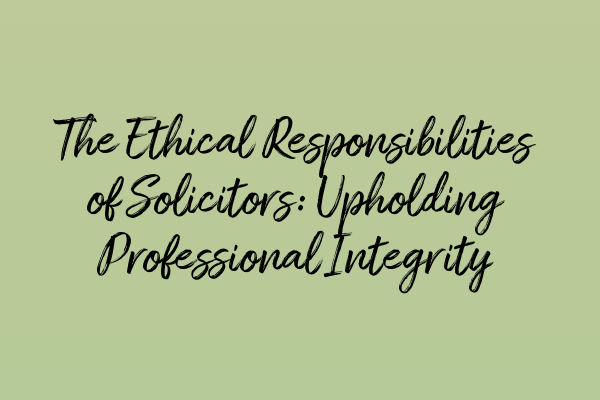The Ethical Responsibilities of Solicitors: Upholding Professional Integrity
As solicitors, we have a crucial role in society. We are trusted advisors, advocates, and guardians of the law. Our clients rely on us to not only provide expert legal advice, but also to act with the utmost integrity and professionalism. Upholding ethical responsibilities is not only a legal requirement but an essential aspect of our profession that we must embrace wholeheartedly.
In this article, we will explore the ethical responsibilities that solicitors must uphold to maintain professional integrity. We will discuss the importance of confidentiality, conflicts of interest, client care, and the duty to the court. Let’s dive in!
Confidentiality
Confidentiality is a fundamental aspect of the solicitor-client relationship. Clients need to trust that the information they share with us will remain confidential. Solicitors have a legal and ethical duty to maintain client confidentiality, regardless of the nature of the case.
This duty extends beyond the duration of the legal engagement and applies even after the solicitor-client relationship ends. Trust is the cornerstone of our profession, and treating client information with the utmost respect is crucial for maintaining that trust.
Related Article: Private Prosecutions: Exploring Non-Governmental Prosecutions in Criminal Cases
Conflicts of Interest
Avoiding conflicts of interest is another key ethical responsibility of solicitors. We must prioritize our clients’ best interests and avoid any situation where our personal or professional interests may compromise our ability to provide objective advice.
Identifying conflicts of interest is essential before taking on a new client or case. We must conduct thorough assessments to ensure that we can provide unbiased representation and avoid any potential conflicts that may arise during the course of the legal engagement.
Related Article: Ethical Challenges in Criminal Defence: Navigating Dilemmas
Client Care
Solicitors have a duty to provide competent and diligent representation to their clients. This duty includes keeping clients informed about the progress of their case, providing honest and realistic advice, and ensuring that clients are aware of any potential risks or challenges they may face.
Effective communication is vital in maintaining strong solicitor-client relationships. Listening to clients’ concerns, promptly responding to their queries, and providing updates on their case are all aspects of providing exemplary client care.
Related Article: Understanding Drug-related Offences: Laws and Penalties in the UK
Duty to the Court
Solicitors have a duty to the court that goes beyond their duty to clients. We are officers of the court and must act in a way that upholds the administration of justice. This means presenting accurate and honest information to the court, complying with procedural rules and court orders, and not misleading the court in any way.
Our duty to the court requires us to act with integrity and professionalism, even if it may not align with our clients’ wishes. We must always prioritize the interests of justice and ensure that proceedings are fair and transparent.
Related Article: Magistrates’ Court vs Crown Court: Different Paths in Criminal Proceedings
In conclusion, solicitors have significant ethical responsibilities that are essential in upholding professional integrity. Confidentiality, avoiding conflicts of interest, providing excellent client care, and fulfilling our duty to the court are all crucial aspects of our profession.
By adhering to these ethical responsibilities, we not only maintain the trust of our clients but also uphold the reputation of the legal profession as a whole. As solicitors, it is our duty to embody the highest standards of professionalism, accountability, and ethical conduct.
Related Article: Criminal Defence Strategies: Expert Approaches to Protecting Clients’ Interests


Leave a Reply